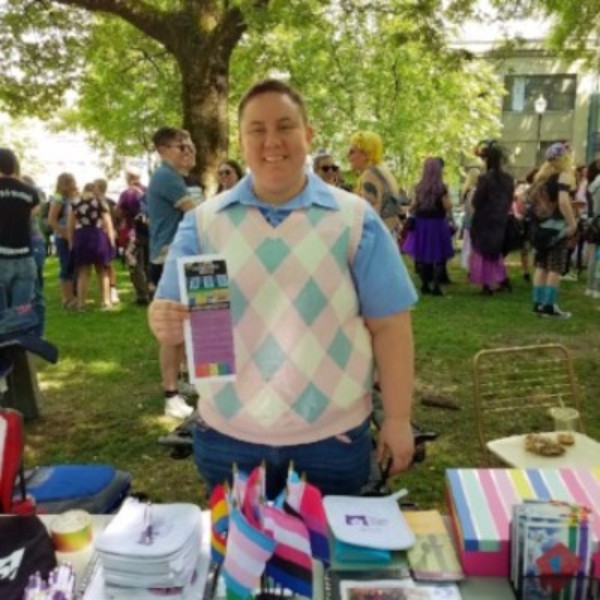 By Diane Hess, Education & Outreach Director
By Diane Hess, Education & Outreach Director
(Pictured at right, FHCO Board Member Julia Mckenna, at Trans Unity Pride Celebration, June 16)
Tragically, acts of hate have dramatically increased over the last two years-occurring in housing, at schools, on transit and in many other settings.
Oregon, like the rest of the country, has experienced this spike in hateful attacks on individuals because of their race, religion, national origin, sex, sexual orientation and gender identity. Statistics of reported incidents are only an indicator of this growing problem as only a fraction of these acts are ever reported. There has also been a simultaneous rise in the number of active hate groups. There are now 11 such groups operating in Oregon.
FHCO is committed to actively opposing hate through our outreach, education and enforcement work. We are working collaboratively with other organizations to improve the reporting and tracking of hate and bias crimes, provide assistance to victims, and educate communities on how best to respond to and prevent acts of hateful harassment. FHCO is an active member of Portland United Against Hate, a partnership of community based organizations, neighborhood associations and the City of Portland. The coalition is developing a rapid response system that combines tracking hateful acts and providing support and protection to impacted communities. FHCO is also a member of the statewide Coalition Against Hate Crimes, composed of civil rights groups and government organizations, which has been providing resources to victims, carrying out community education, and organizing community responses to acts of hate for more than 20 years.
“Harassment, threats and intimidation” in housing based on protected class violate the federal Fair Housing Act (Section 818). This includes acts carried out by housing providers, their staff and vendors, and also by neighbors. All housing providers, including landlords, managers of manufactured/mobile home parks and home owner association (HOA) boards have the legal responsibility to intervene and address harassment based on protected class when both parties live in their communities. In 2016, HUD issued a ruling reiterating the prohibition on harassment and clarifying the liability for housing providers who neglect to intervene.
FHCO’s discrimination hotline has experienced an increase in complaints of hateful harassment based on protected class. These include verbal attacks, written hateful messages, swastikas, graffiti, and harassment through social media. A few examples include a property manager using racial slurs against Hispanic and African American tenants; residents in a senior property taunting a resident with a traumatic brain injury and purposely trying to hit her service dog, and residents of a mobile park shouting homophobic slurs at their lesbian neighbors and leaving dog feces on their front porch.
In Oregon, landlord tenant law provides generally for the “right of peaceful enjoyment of housing”. Issues of harassment may arise in communities over noise, parking, animal waste and disputes between residents’ children. Addressing disputes between residents can be a challenge for housing providers who may opt for mediation, warnings, fines (in HOAs) or notices to terminate tenancy (for rentals).
When harassment between residents is based on protected class, it becomes a fair housing issue and potentially a violation of the Fair Housing Act. If a resident is being harassed based on their protected class by another resident in the community and reports it to their housing provider, the provider must act immediately to investigate and take whatever action is needed to end the problem. There have been cases against providers who knew of persistent hateful harassment and took no action; damages have been as high as $550,000.
Different responses may be utilized in different situations. In one example, a property manager in a building where a resident hung up swastika curtains notified all residents they were required to use the blinds that came with their units. HOAs may utilize fines and other consequences. Landlords may follow warnings with notices of termination. There are times when it is necessary to involve law enforcement. After taking action to remedy the problem, providers are required to follow up with the victim of the harassment to ensure the problem has ended.
FHCO recommends housing providers have a clear policy against resident on resident harassment. The policy instructs residents to notify the provider if they experience harassment based on protected class and explains that such harassment will not be tolerated on the property. FHCO has developed a sample policy that has been adopted by many providers in Oregon.
Beyond legal requirements, now is a time for all of us to explore what we would do if someone near us experiences hateful harassment, threats or intimidation. What if a neighbor or the person sitting behind us on the bus or the student at the next desk is harassed because she is Latinx or trans or wears a hijab? This is something to think through in advance-when and how we would intervene and offer support. One strategy that may yield results is to engage the person being harassed in conversation on a random subject, ignoring the harasser, and then escort the person to a safe place. Clearly, we all need to be aware of our own safety and there may be times when the best strategy is to contact law enforcement.
If you encounter a violent hate crime, report it to 911. Non-criminal harassment should be reported to local law enforcement, the non-emergency number. Police keep track of these incidents and they could be evidence if hate crimes that were committed by the same individual or group.
